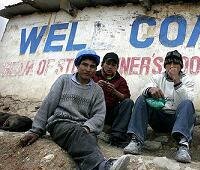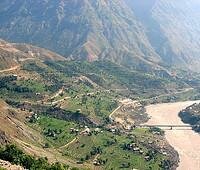Climate Cycles Are Driving Wars, Says Study
Issue:Climate change
In the first study of its kind, researchers have linked a natural global climate cycle to periodic increases in warfare. The arrival of El Niño, which every three to seven years boosts temperatures and cuts rainfall, doubles the risk of civil wars across 90 affected tropical countries, and may help account for a fifth of worldwide conflicts during the past half-century, say the authors.
Image source: The U.S. National Archives
Article source: The Earth Institute
Read more »Posted on 31/08/11
Why Here, Not There? Investigating emerging nonviolent movements
Issue:Marginalisation
The International Peace & Security Institute (IPSI), in collaboration with The Johns Hopkins University School of Advanced International Studies (SAIS) Conflict Management Program, hosted a high-level panel discussion and networking reception on Wednesday, August 17. The event, “Why Here, Not There? Investigating emerging nonviolent movements,” examined the dynamics that enable nonviolent movements to occur in some regions and not others at specific moments in time. The event was broadcast live nationwide and on the internet by C-SPAN.
Watch the video here: IPSI
Image source: Al Jazeera English
Read more »Posted on 23/08/11
Resource Scarcity, Climate Change and the Risk of Violent Conflict
Issues:Climate change, Competition over resources
 This paper from Alex Evans of the Center on International Cooperation at New York University provides a brief assessment of how natural resource scarcity and global climate change may change the risk of violent conflict in the future.
This paper from Alex Evans of the Center on International Cooperation at New York University provides a brief assessment of how natural resource scarcity and global climate change may change the risk of violent conflict in the future.
Image source: United Nations Photo
Beyond Supply Risks: The Conflict Potential of Natural Resources
Issue:Competition over resources
While the public debate about resource conflicts focuses on the risk of supply disruptions for developed countries, the potentially more risky types of resource conflict are usually ignored. As part of a two-year research project on behalf of the German Federal Environment Agency, adelphi and the Wuppertal Institute for Climate, Energy, and Environment have analyzed the risks of international conflict linked to natural resources in a series of reports titled Beyond Supply Risks – The Conflict Potential of Natural Resources.
Article source: The New Security Beat
Image source: Olmovich
Read more »Posted on 11/08/11
UK Trident renewal
Issue:Global militarisation
In the UK, the Conservative-Liberal Democrat coalition government continues to pursue the renewal of Britain’s Trident nuclear weapon system amidst criticism of the opacity of the procurement process and concerns over the substantial and increasing costs of the project. Adding fuel to public anger over widespread government cuts, the Defence Secretary Liam Fox’s long overdue announcement in May 2011 that the Initial Gate for the project had been approved was accompanied by the revelation that when inflation is taken into account the price tag for just the new submarines (excluding missiles, warheads and running costs) is likely to be £25 billion, as opposed to the £11-14 billion announced in 2006. With the defence budget already curtailed by the October 2010 Comprehensive Spending Review (CSR) and under strain on account of a projected deficit of £36 billion over the next 10 years, these latest figures have prompted further concerns that Trident is being replaced at the expense of conventional military capabilities.
Article source: The Acronym Institute
Image source: UK Parliament
Read more »Posted on 11/08/11
Increasing Competition Over the Indus
Issue:Competition over resources
Water managers in the Indus Basin will have to overcome a host of overlapping socio-economic, environmental, and policy pressures as they strive to fulfill their society's future water needs writes the Stimson Center's David Michel.
Image source: sunbeer.
Read more »Posted on 3/08/11








